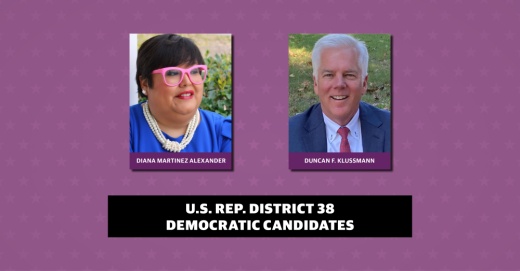Alexander earned 44.6% of the votes, and Klussmann earned 39.3% of the votes in the primary election, according to the Harris County Elections Administration. Wesley Hunt claimed victory in the Republican race with 55.3% of the votes. Hunt and the winner of the May 24 runoff election will face each other in the general election this November. Early voting runs May 16-20, and election day is May 24.
Bryan Henry, a political science professor and the civic engagement coordinator at Lone Star College-University Park, moderated a public forum with the two candidates May 11. Candidates shared their positions on topics ranging from reproductive rights and the importance of public education to immigration reform and the national economy.
Public education
Both candidates have backgrounds in public education. Klussmann is a former superintendent of Spring Branch ISD and now teaches at the University of Houston. Alexander is an educational diagnostician with 23 years of experience as a public educator.
Alexander said educators are discouraged by the attacks of school board candidates seeking to change the dynamics on school boards, highlighting May election results in Katy and Spring Branch ISDs.
“I see where groups of ... entitled parents have tried to strongarm the school boards into banning books from authors who are from different perspectives and kind of railroading these conversations ... where parents [are] changing what we have envisioned for education. This is supposed to be the equalizer, and we're not allowed to do what we need to do,” she said.
She also cited pressure from the Texas Legislature and said she would fight against high-stakes testing and the threat of undocumented students not being able to access free education.
Klussmann said education is a top priority for him because of his experiences throughout life.
He believes control has been removed from the classroom since before the pandemic, and he said “the people closest to the action,” or classroom teachers, should be trusted to identify problems and address those issues as they see fit.
“Also, I believe right now what can happen from a federal standpoint is if I'm elected, the first thing I'll do is to work to make sure that we eliminate high-stakes testing,” Klussmann said. “That's the first thing we should do right now to take away the stress from students, from parents and from teachers, and use those tests only for diagnostic reasons.”
Reproductive, LGBTQ rights
Klussmann called the recently circulated U.S. Supreme Court draft ruling to overturn Roe v. Wade “weak” and “problematic.” He said he believes this draft ruling means everyone’s rights are under attack and that he would support expanding the Civil Rights Act.
“If that rationale holds some way, then there are so many other issues that are up for discussion around gay marriage, around Brown v. Board of Education, around contraceptives. ... Basically if the word is not in the Constitution, the states have complete control over that area,” he said. “In fact, if that's the case, Texas could pass a law that wouldn't allow Wesley Hunt to be married to his wife because that law was in place in Texas.”
Protecting reproductive rights is a priority for Alexander, who said she worries about her college-age daughter’s “ability to control her bodily autonomy.” She said she feels a responsibility to fight to keep abortion legal.
Alexander also said protection for the LGBTQ community is part of her platform, noting students in local schools are being bullied for wearing nail polish or for the length of their hair.
“These gender identity controversies are a manufactured crisis, and really, it's just institutions using their power to oppress their students that are in their charge,” she said. “So when we think about that, as well as the right to be in a marriage, conservatives have been gunning for this since 2015 when [same-sex marriage was legalized].”
U.S. economy
Citing a declining unemployment rate and high economic growth in 2021, Henry asked both candidates whether Democrats should run on the nation’s economic successes or on the continued challenges working Americans face.
Klussmann said both sides of the issue are important and recalled living through various times of inflation. He said he believes the bandwagon effect of prices increasing even in industries that do not have supply issues can be addressed through effective fiscal policy and acknowledging economic successes.
“I think there's a way to really emphasize this message and get that message out there, but I think we also have to have a reality of prepare people for inflation, and what inflation is like and how we work through that in a very difficult time,” he said.
Alexander said Democrats should work to remove barriers for working families when possible, sharing her own experience of seeing her mother work three jobs in the 1980s only to lose their house.
One example she shared was to expand and make the enhanced earned income credit permanent to remove more children from poverty.
“When we uplift working families, the payoff is huge. And all that money goes back into the economy, and that is something that we need,” she said. “Even middle-class families benefited from that policy, and it hurts when those types of funds go away. People are still suffering from the effects of the pandemic.”
Learn more about these candidates at www.dianafortexas.com and www.duncanfortexas.com. Visit www.harrisvotes.com for more information about the election.





